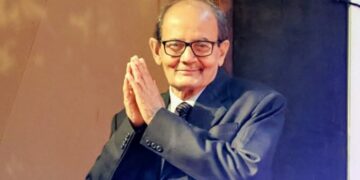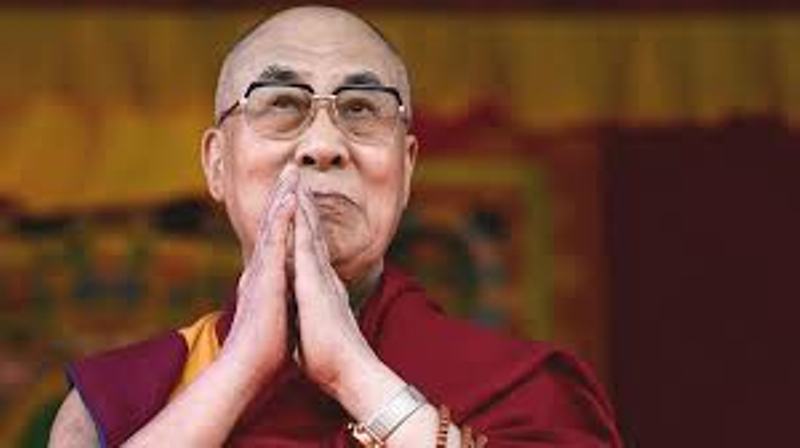By Claude Arpi
The dust has begun to settle in the hill station of Dharamsala, where Tenzin Gyatso, the 14th Dalai Lama of Tibet, celebrated his 90th birthday in the presence of a host of dignitaries, venerable rinpoches, ordinary lamas and countless visitors.
On July 2, the world-revered Tibetan spiritual leader reaffirmed that the institution of the Dalai Lama was here to stay. A few months earlier, in the book Voice for the Voiceless, he had clarified: “Since the purpose of a reincarnation is to carry on the work of the predecessor, the new Dalai Lama will be born in the free world (outside China).”
However, the time needed for a reincarnation to reach adulthood would leave his succession vulnerable to Chinese manipulation.
In an earlier statement in November 2011, the Dalai Lama had mentioned two possibilities: a traditional reincarnation (leaving written instructions on how to find the reincarnation) or an ‘emanation’, which would involve the transfer of his consciousness and knowledge into a specially selected young boy.
The possibility of an emanation seems to have been dropped for now—a regrettable development, as it would have shortened the time gap between the birth of the Dalai Lama and the time he reaches maturity. In the past, this gap has been exploited by China to interfere in Tibetan internal affairs.
The July 2 statement triggered a war of communiqués between China and India, as Beijing expects to control the succession process—and the next Dalai Lama.
China’s Foreign Ministry spokeswoman Mao Ning told the press: “The Dalai Lama’s reincarnation must follow the principles of domestic recognition and approval by the central government, in line with religious traditions and laws.”
India’s Minority Affairs Minister Kiren Rijiju, upon his arrival in Dharamsala to attend the birthday celebrations, asserted that the decision would be taken only by the established institution and the Dalai Lama himself, and “nobody else”—a clear reference to China.
The Ministry of External Affairs also shared its perspective: “The Government of India does not take any position or speak on matters concerning beliefs and practices of faith and religion.” Could this be a message to Beijing—an atheist state—to stay out of the debate?
What seems to have particularly irritated Beijing was Indian Prime Minister Narendra Modi’s message on X: “I join 1.4 billion Indians in extending our warmest wishes to His Holiness the Dalai Lama on his 90th birthday. He has been an enduring symbol of love, compassion, patience and moral discipline. His message has inspired respect and admiration across all faiths. We pray for his continued good health and long life.”
Beijing was not amused. Mao Ning told a media briefing: “The 14th Dalai Lama is a political exile, who for a long time has been engaged in separatist activities and attempted to separate Xizang from China under the cover of religion.” Xizang is China’s new official name for Tibet.
She added, “India should act and speak prudently and stop using this issue to meddle in China’s internal affairs.”
Even the Buddhist Association of China issued a statement saying: “The central government has the right to make the final decision on the reincarnation, which is by no means subject to the 14th Dalai Lama’s individual discretion.”
We are bound to see more of these contradictory declarations.
The ‘minority’ gap
The future is uncertain, though the Dalai Lama has recently said that he hopes to live to 130 years.
For one thing, Beijing has been actively preparing for his ‘return’ in China—notably through the 2007 promulgation of the “Measures on the Management of the Reincarnation of Living Buddhas in Tibetan Buddhism”—and by promoting its own Panchen Lama and other ‘high’ lamas, often using them in its propaganda war against Dharamsala.
Governance by incarnation has always been a major vulnerability in the history of the Tibetan state, as it leaves the Tibetan nation without effective leadership for a period of around 20 years. Even though, since 2011, the Dalai Lama has delegated his temporal powers to an elected Sikyong or President, his presence remains the principal unifying force for Tibetans from the three traditional provinces (U-Tsang, Kham and Amdo), as well as for the various schools of Tibetan Buddhism and the ancient Bon faith, still practised by some Tibetans.
This gap—referred to by the British as the ‘Minority’—has historically resulted in a lack of political, temporal and spiritual leadership. During such periods, no major decisions could be taken, with consequences that are still evident today. It could be likened to a ship adrift at sea without a captain.
Communist authorities have already planned his ‘return’ under party regulations. The 15th Dalai Lama would have to be a Communist first and a religious leader second. Furthermore, he would not be allowed to reside in Tibet—only to make occasional visits.
In exile, once the interregnum begins, the duties of a single-person regency or a collegium (or council of regency) would be limited to overseeing the religious affairs connected with the welfare and education of the 15th Dalai Lama. However, their actions could have wider implications for India’s security, given the one million Indian followers of the Dalai Lama living along the northern border.
Should the reincarnated Tibetan leader return to India (from Ladakh, Kinnaur, Spiti, Sikkim or Arunachal Pradesh), he would certainly be welcomed warmly by the people—and hopefully also by the government, even if Delhi remains publicly silent so as not to provoke China.
There are, however, many pitfalls associated with the concept of ‘regency’. In the past, many regents failed to unite Tibet. Worse, in 1947, Tibet teetered on the edge of civil war due to infighting between two regents.
In the 19th century, the Manchus devised a sinister method: before a young Dalai Lama could reach maturity, he would mysteriously pass away. This allowed the Ambans—the Chinese emperor’s ambassadors—to impose their will in the Land of Snows.
One thing is certain: China will not relinquish the issue. At stake is the legitimacy of 75 years of forceful occupation of Tibet.
Claude Arpi is a Distinguished Fellow at the Centre of Excellence for Himalayan Studies, Shiv Nadar Institution of Eminence, Delhi-NCR
Originally published under Creative Commons by 360info™.















